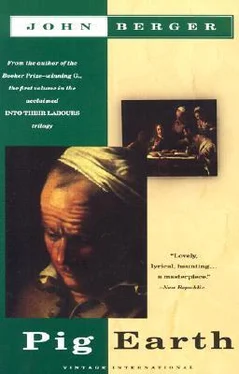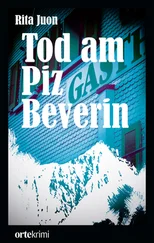From here we walk, he said. Give me the key. Wait a moment, let’s see. Yes, open the driver’s door.
They took a path which led down the escarpment. Only Marcel knew where the path led. His two prisoners fell, lost their gloves and floundered in the waist-high snow. To tell the truth, testified the younger one, the prospect of falling over the edge did not disturb me much because I was convinced anyway that we were being taken to our place of execution.
At the bottom of the escarpment there had once been a farm. It had burnt down and only the wooden grenier, the size of a horse’s stall, remained.
Marcel handed the chief inspector a large key, as long as a hammer.
Open the bottom door.
The door was no taller than their chests. The inspectors had to stoop to enter. There were no windows. The floor was stone, and the wooden walls were as thick as the door. Greniers were built like strong-rooms.
What are you going to do? asked the chief inspector.
Now at last he did not speak for the benefit of the absent authority. He was addressing directly the man who held the gun and sat in the doorway.
I’m going to shut the door and lock it from the outside!
You can’t do that. We’ll freeze to death.
Marcel shook his head.
Our clothes are wet.
They’ll dry.
There’s no window. We’ll die of suffocation.
The silhouette in the door again shook his head.
There’s no light.
No, there’s no light.
There’ll be a search party out for us!
Not yet.
I tell you, if you leave us here, we’ll die of exposure.
I’m leaving you a bottle of gnôle. Marcel stood the bottle on the floor.
How long? asked the chief.
Without answering Marcel got to his feet, went out into the snow and locked the door with the key. The inspectors, who belonged to the Special Section for the Investigation of Fraud of the Ministry of Finance, were thumping with their fists against the ceiling.
When Marcel reached the car on the road above, he hesitated. He tried to push it to the edge of the escarpment. His boots slipped in the snow. He knew enough about driving to drive ten metres. He had been right that it wouldn’t have taken him long to learn to drive a tractor. Cautiously he got out of the driver’s seat. This time he scarcely had to push. The car crept forward, and plunged down the shale slope. When it hit a pine tree it turned over and rolled further down. Finally it came to rest on its side and the snow started to cover it.
Is their car still there? he once asked Nicole when she came to visit him in the prison at B.…
Before nightfall he returned to the grenier. It stank of gnôle. The prisoners said they had knocked over the bottle in the dark. He suspected that they had drunk most of it, and then broken the bottle deliberately with the idea of using it as a cutting tool or a weapon. There was blood on the younger one’s hand.
We use gnôle as an antiseptic, Marcel said. We also use it for preserving fruit and herbs so that we have something special to offer guests when they visit.
Our families will have notified the police, warned the chief inspector.
We use it too, continued Marcel, for dulling the pain of animals.
The chief had taken off his tartan cap and was using it as a kind of muff for his hands as he paced backwards and forwards. He could only take two very short strides in each direction.
To kidnap two state officials, said the chief inspector as he turned in circles, in pursuit of their official duty is an act of treason. You will be tried and sentenced. Make no mistake about it. They are already out looking for us!
Marcel sat in the doorway, the gun across his knees, studying his prisoners.
You have no hope of escape, said the chief inspector. The weight he was giving to each word, before his voice fell over it to proceed to the next, suggested that he was drunk.
Marcel stared at him, wondering.
Suddenly the chief inspector stopped turning in circles and knelt on the floor.
Listen, my friend, listen carefully to what I’m going to say now. Release us. Take us back to our car. I shall have to report the matter but we’ll say it was a practical joke. Nothing more serious than a practical joke. We’ll call it a joke! shall we call it a joke now?
The chief inspector held out his hand to clinch the deal.
I’ve brought you bread, water, two blankets, matches and a candle, said Marcel. The candle won’t burn all night so you had better economise with it.
The chief inspector was on his feet, pacing in circles again. For the last time, he screamed at the top of his voice, we’re offering to consider you a joker!
Marcel left them and hid the shotgun in the upper part of the grenier to save taking it home. It was freezing hard and his boots squeaked in the snow as he followed his own tracks and planned what to do next.
The same evening he visited his neighbour Jean-François. All the village knew by now that Marcel had had the bad luck to be booked by the inspectors. Jean-François commiserated with him. What has happened has happened, said Marcel. Nobody yet knew that the inspectors had disappeared. Marcel came quickly to the point of his visit.
I want to borrow six sheep.
In God’s name what do you want them for?
For a practical joke.
On who?
I can’t tell you.
On me?
No.
Jean-François started to laugh. If it’s not on me, what are you going to do with the sheep? You’re going to put them somewhere unlikely, aren’t you? Somewhere where you never think of a sheep. In the Chapel? Seigneur! What an idea. You’re going to take them to the Chapel!
I can’t tell you!
How long do you want them for?
A few days.
A few days. It’s a joke that goes on then?
It’s a lesson—
A lesson! I see it now. You’re going to take them to the school! You want them for several lessons. Why do you need six? Wouldn’t one be enough?
I need six.
The following day Marcel fetched the sheep in his cart. A bluish frost settled on the curls of their grey wool, and they buried their muzzles in each other’s flanks. When he turned round to look into the cart he saw only one anxiously raised head. The others were huddled together, heads down.
To cross the field to the grenier he had to carry the sheep on his shoulders one at a time. In the upper room of greniers were stored bottled fruit, honey, the bed linen, the wool, the wedding dress, the coverlet for the cradle; in the bottom room were stored sacks of flour and grain, purified butter, the bacon and the demijohns of gnôle . Greniers were always built a certain distance from their farm so that if the house caught fire, the basic victuals and a few family treasures would be saved.
Marcel opened the bottom door. It smelt of urine. The two men hunched up against the far wall put their hands to their faces to protect their eyes against the sudden light.
You are moving upstairs, Marcel told them.
My colleague needs a doctor, said the young inspector. He has acute pains in his stomach.
He’ll be more comfortable upstairs. Put your hands on your heads, both of you. Come on out! Let me see. Yes, go up the stairway on the left.
The two prisoners, having stooped to pass through the small door, did not bother to straighten their backs on the staircase, and climbed up on all fours. The younger one pushed open the upper door, and found himself staring into a ewe’s eyes.
There’s no room, he muttered, it’s full of sheep.
They won’t hurt you.
It’s impossible! said the chief.
Marcel swore and jabbed his gun at him.
Bent double, the men entered and the sheep bleated.
There’s a bale of straw in the corner, said Marcel.
His two prisoners sat on the bale. The sitting position made them less animal-like.
Читать дальше












